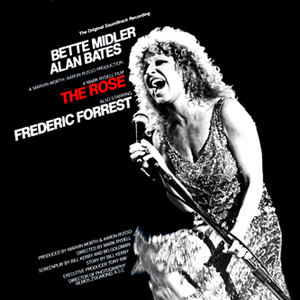by Chris Feil
 History may never let us forget that The Rose began as a Janis Joplin biopic before objections from her family and even its eventual star, Bette Midler. And sure, the similarities remain: a tragic end after a life of drugs, booze, and emotional bruises so deep that they bled out into the vocals.
History may never let us forget that The Rose began as a Janis Joplin biopic before objections from her family and even its eventual star, Bette Midler. And sure, the similarities remain: a tragic end after a life of drugs, booze, and emotional bruises so deep that they bled out into the vocals.
But the unfortunate side-effect of the Joplin adjacency is that Midler’s achievement is overshadowed in the public consciousness. It’s Joplin as template only and its songs are nearly all covers of other blues and rock artists, and still Midler creates her own unique persona and musical identity. When so many actual biopics fail to discover the inner humanity of an artist, she ends up capturing the the crushed spirit of an entire genre...
The 1979 film was Bette Midler’s movie breakthrough and remains one of the most staggering film performances, musical or otherwise. Midler had by this time already spawned hit albums and Grammy wins, and you can see how her lounge singer beginnings prepared her for this grand platform. Her Rose is ferile and profane, constantly soothing and abetting a desperate need to be affirmed, her heart and her wounds always threatening to overtake her. But she’s also contradictory and unpredictable, like the tenderness in her speaking voice in stark contrast to the unleashed beast in her songs. If that doesn’t embody the blues, I don’t know what does.
The physical soundtrack itself includes some of her monologuing as tracks, as if it is somewhat aware that the songs don’t do her justice without the performance between them. Recorded live, we hear the adoring crowd that makes her come alive, subtly reminding us how this wave affection keeps her darkness at bay in performance. But a more traditional, studio recording would have also potentially sacrificed the attentive, responsive work Midler is doing. And, of course, it’s sometimes a whole lot more fun.
By the time the film makes its one reach into the depths of the Janis Joplin songbook for “Stay With Me”, we have forgotten its biopic origins thanks largely to immersiveness of Midler’s pathos. That’s part of the power of this performance, its own distinct musical persona laid threadbare from pain we can also recognize in one too many deceased artists. And sadly, those currently on similar spirals to Rose. Midler is a ghost of them all, and still her own devastating and specific creation.
This is Rose laying all of it bare as she also loses her capacities, with Midler given the rare opportunity to play all of her character’s functions to their maximum. Here she mourns her current heartache and every individual one before it, her destructive need for the crowd’s love to fill all of those gaps, and maybe even self-awareness that she’s losing all of it in that very moment. It’s masterful self-destruction. What more does she have to give after this?
As she dies before the crowd, then fades in the film’s most enduring number and its sole original one, “The Rose”. More than a funeral march for its eponymous songstress, it represents the fragile mindset that kept her going for as long as she could, a quiet hope for the future.
Its singular sound then splits into layered harmonies, as if each is one of the fractured pieces of Rose’s shambled persona speaking to eachother. The voices come together as one at the song’s close, promising a healing that cannot be found in Rose’s sad end. Perhaps that holistic final note is a hopeful cautionary tale to watch over the legends yet to be lost, awaiting their rebirth from what ails them.
All Soundtracking installments can be found here!